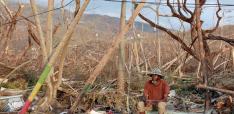Wake Up Call – Climate Change is Already Here
Martha Molfetas argues that we already have the knowledge to tackle climate change, what we need now are the leaders.
We have forever changed our world and now exist in a period of geological history affectionately referred to as the Anthropocene, or the period where our impact as human beings is stronger than any natural force at work within nature. This new enlightenment comes at a time when we are faced with new challenges scientists have warned about for decades. The last few years have been like a hike through the Book of Revelations, with excessive water and flooding in some areas, and drought that scorches the earth in others – not to mention the stronger impact of storms and hurricanes. Our impact can be felt through the rising costs of food and by more profound events like the melting of a huge piece of West Antarctica, which could set us on a path of up to thirteen feet of sea-level rise. The latter should be the final wake up call. We cannot hit snooze and leave the challenges we face for future generations to cope with and continue on our current trajectory. Not only would it be an unforgettable embarrassment for current generations in power, it would go against that whole democratic idea of preserving and improving society for our posterity.
Luckily for us, 2014 has already been filled with wake up calls. In recent IPCC, World Bank, and US Government reports, climate change has been defined as a key challenge to our survival, military security, governance, and to life as we know it. All these reports cite the potential military and security challenges ahead as livelihood and commodity resources become increasingly scarce or stressed, and finite resources like water and oil continue to be exploited. They also describe a harsh reality for coastal communities, which account for approximately 44% of the global population, and for those in developing countries, or roughly 6 billion of the people on the planet. In the World Bank report released this week, global food prices have increased by 4% in just the last five months. The World Bank stated that this could be a strong catalyst for food riots and potential instability akin to what we saw in the Arab Spring of 2011-2012.
US government reports cited various issues for America, particularly describing climate change as a military threat, while being sure to underscore that the effects of climate change have indeed impacted the US, and are caused by us. This is a new revelation for the US, and one that could push the US to make large strides in climate diplomacy come COP-21 in Paris, now that the effects of climate change are at their door. In just the first half of this year, the North America has experienced unprecedented drought, polar vortexes, floods, and a drastic, potentially irreversible change to seasons. These reports provide an important codification of what is to come if we do nothing, and more importantly, the dire need for an entire systematic change.
In addition to these warning signs, in the last year, North America saw a continued explosion in shale fracking. This newfound ‘Shale Revolution’ has not come without a price. In 2013, there were approximately 7,662 spills, accounting for 26 million gallons of oil and fracking fluids. As the government continues to bolster support and incentives for the fossil fuel industry, parts of the US are feeling the impact of their new climate reality. The Western US has been hit hard by droughts that are both unprecedented and have threatened water supplies of communities and key commodity crops like almonds and corn. What the agriculture and energy sectors have in common is a reliance on fresh, potable water for the manufacture, distribution, and refinement of products. Currently, two major trends are happening in the United States. On the one hand, we have an expansion of fossil fuels in the US that has not been seen since the oil boom of the 1970’s, and on the other, we have the severe consequences of our actions causing droughts and floods, and putting pressure on already limited water resources. The US is at a domestic policy crossroads. They can both continue to fund and support an industry that is causing irreversible environmental damage, and attempt to cope with drastic seasonal change and drought, or they can lead the way for the next climate policy revolution. When it came to nuclear disarmament, the US led the way. When it came to ozone depletion, or even the creation of the United Nations, the United States has led the charge for global action. What is currently absent from climate talks is a strong leader to galvanize support for the tough choices ahead. Who better to lead this charge than the world’s largest emitter of greenhouse gases?
What current policies fail to present are the large sweeping opportunities to quell an impending doom. Yes, we have caused this calamity, yes – we have a huge impact on our planet, and yes – we already possess the means to change for the better. We already have technology to produce electric vehicles and increase the fuel economy of cars. We already possess the know-how to create and expand solar energy systems and potentially create a complex smart-energy grid that utilizes solar energy produced in North Africa and the Middle East, and hydropower and geothermal energy produced in Europe. We even have the technology to improve existing energy and water infrastructure to improve efficiency and increase output. We can even cope in drought stricken areas by utilizing cisterns to collect rainwater instead of solely relying on aquifers, lakes and rivers to provide fresh water. We have the tools to change course, what we need is the political will to affect global and national policies that would make these tools the new normal before we reach the final tipping point. Policymakers have swaths of information now to act on – from the IPCC, the World Bank, and various other national or regional reports that all describe the effects of doing nothing. COP-21 in Paris represents a real opportunity for our global policies to wake up to our profound climate reality and create policies that create true change, rather than continue to squander precious time. The only question is, will leadership step up to the challenge, and who will lead the charge?


